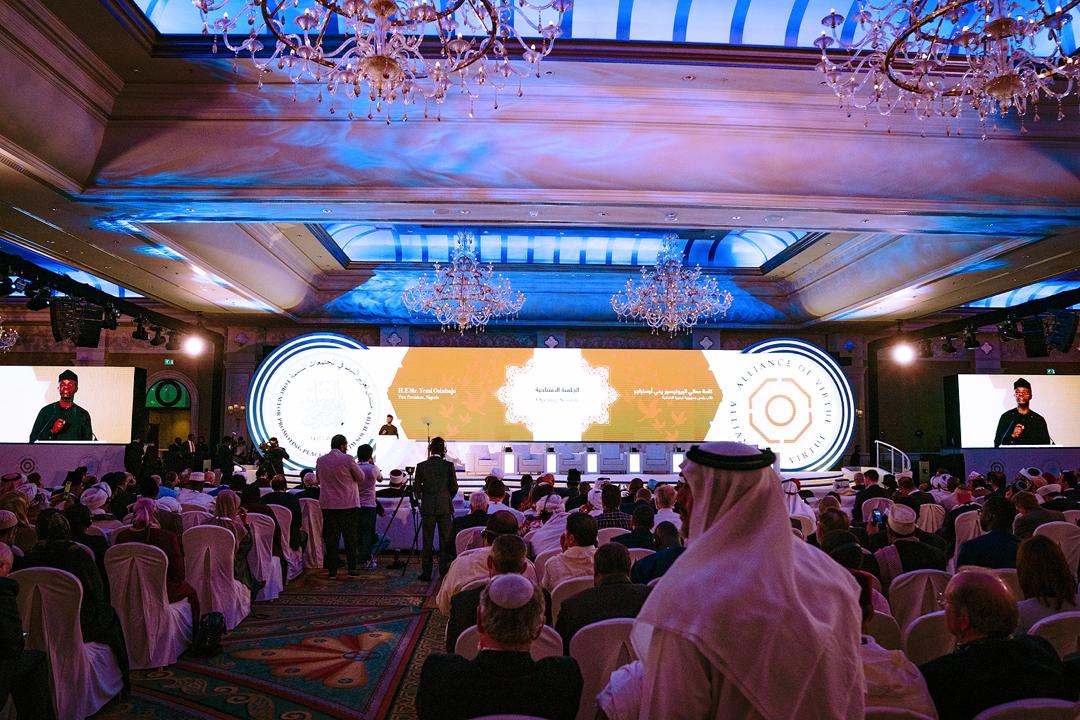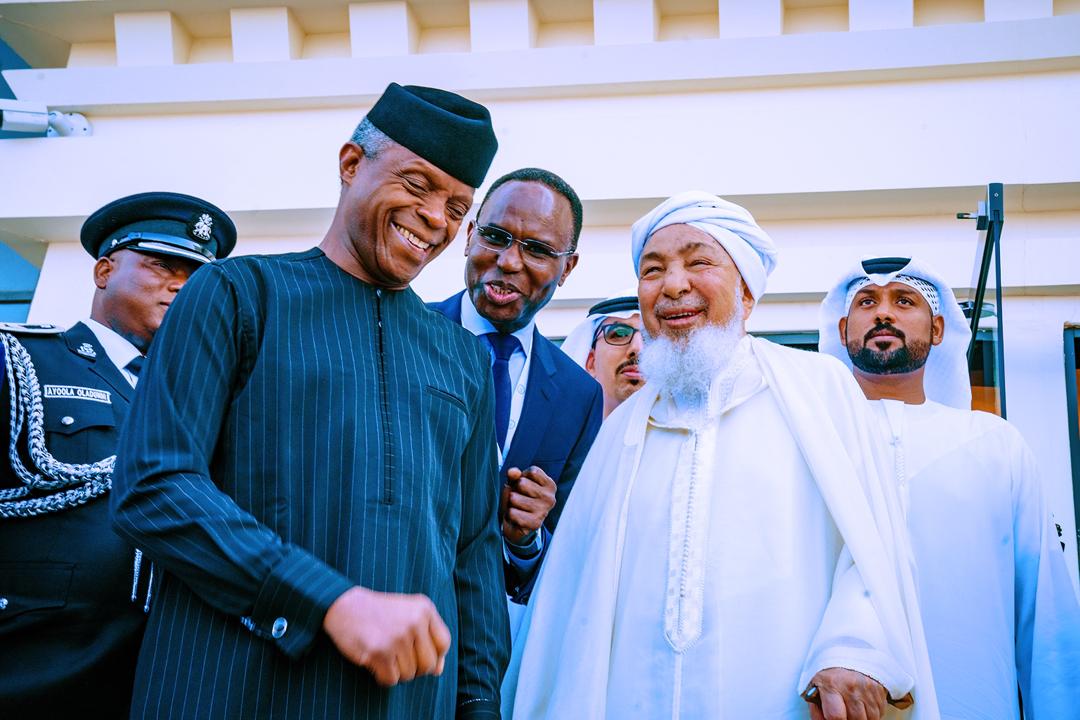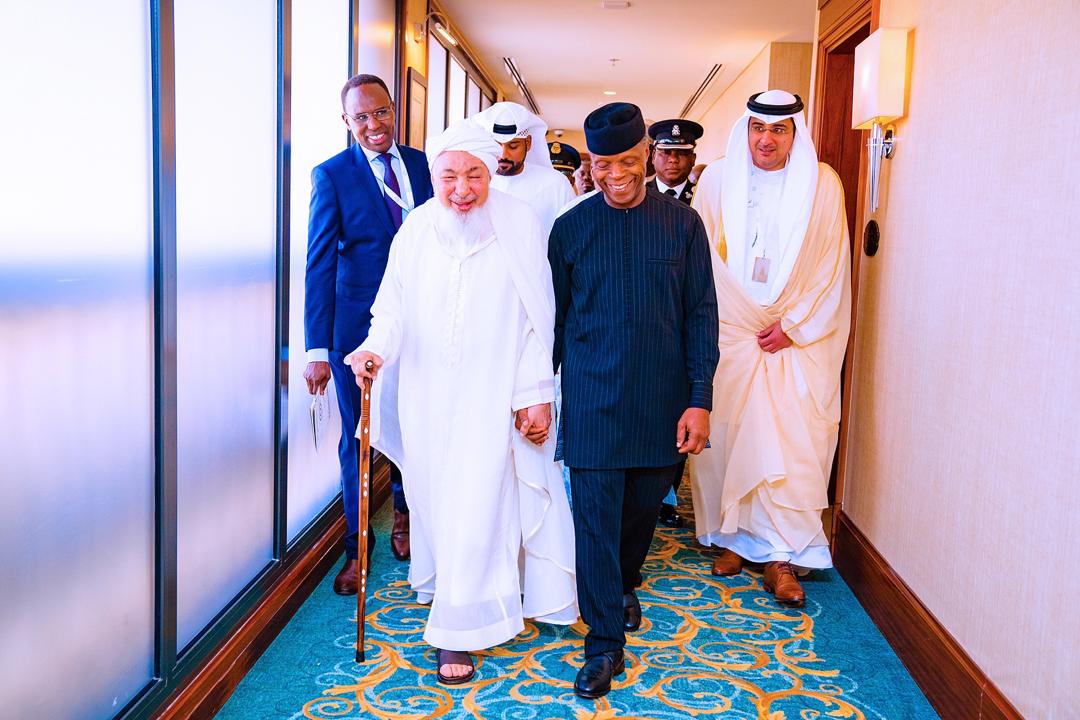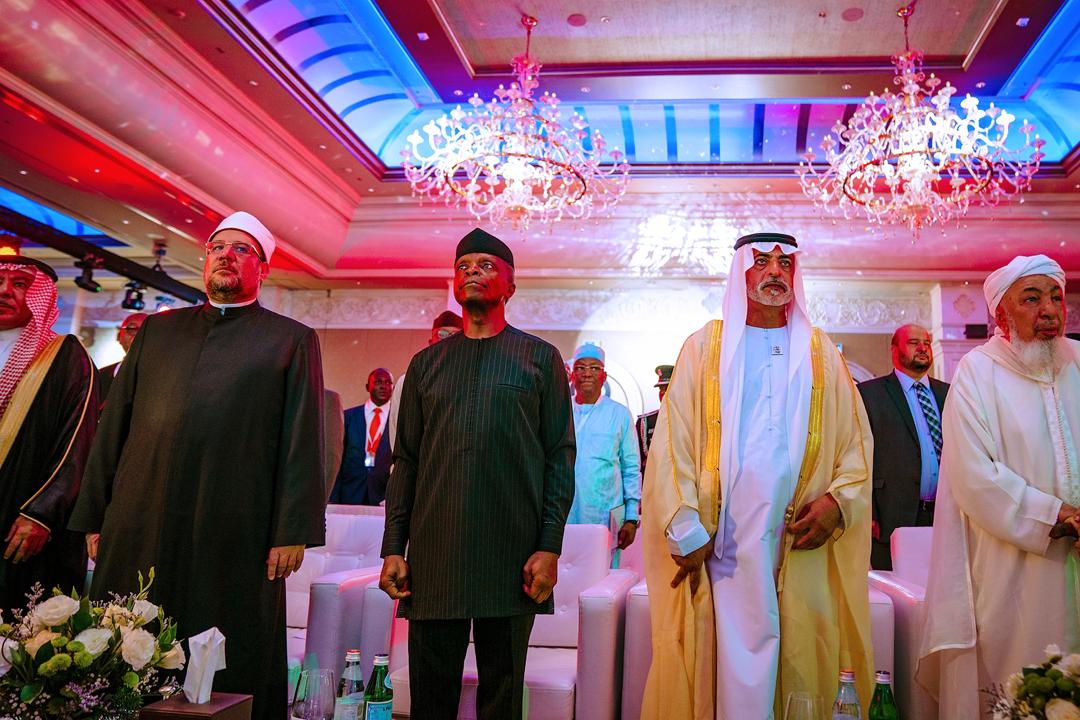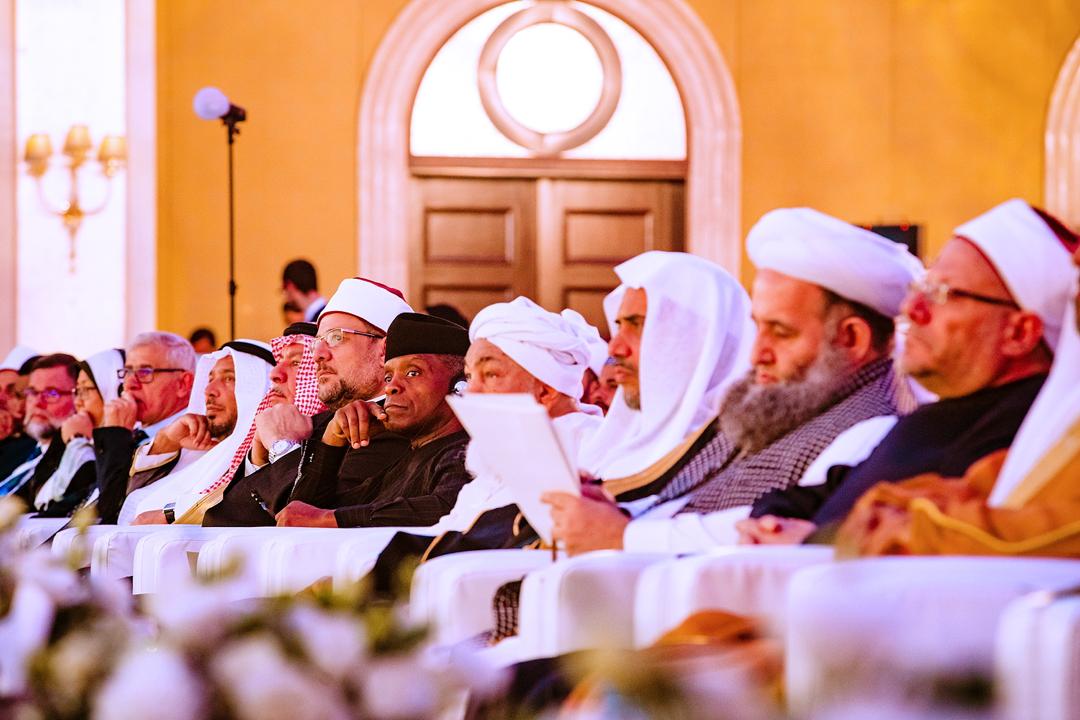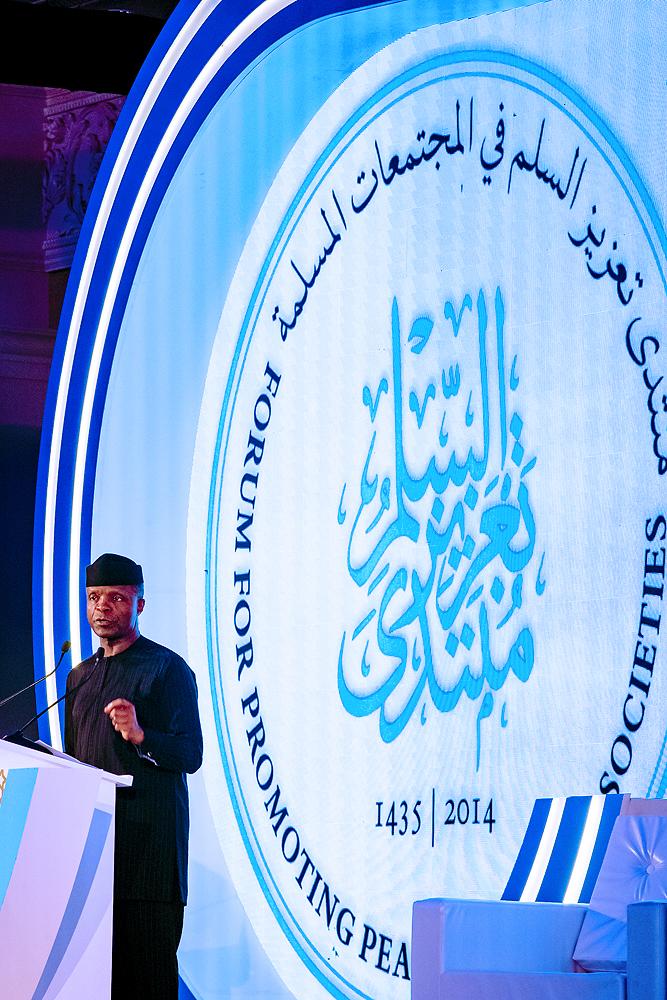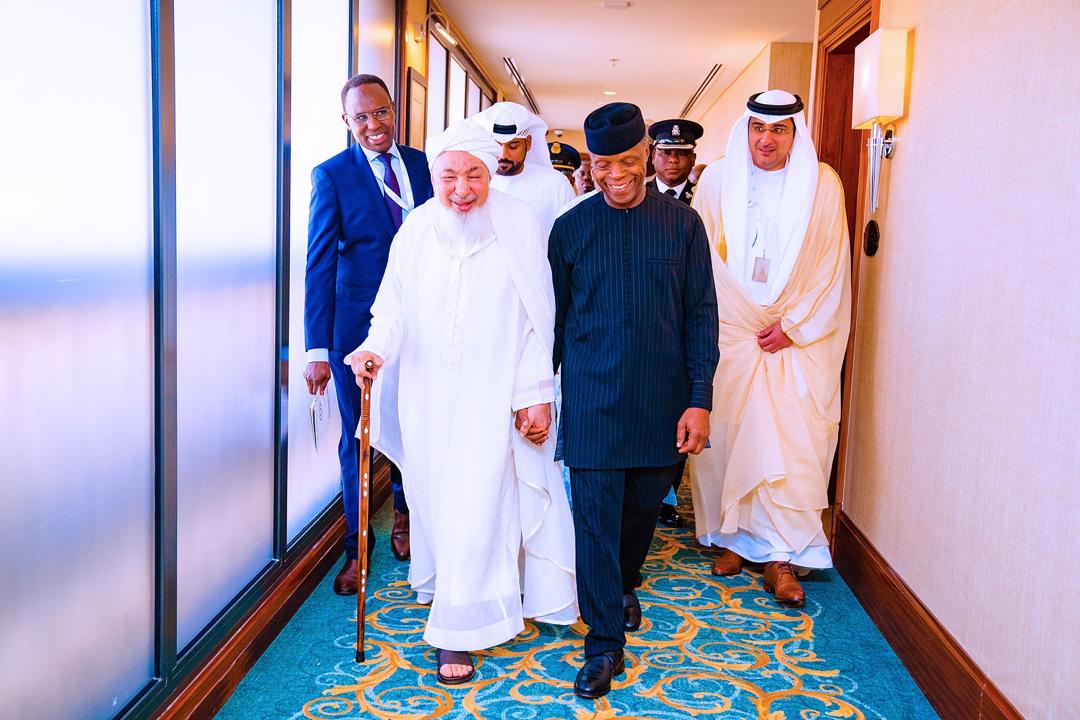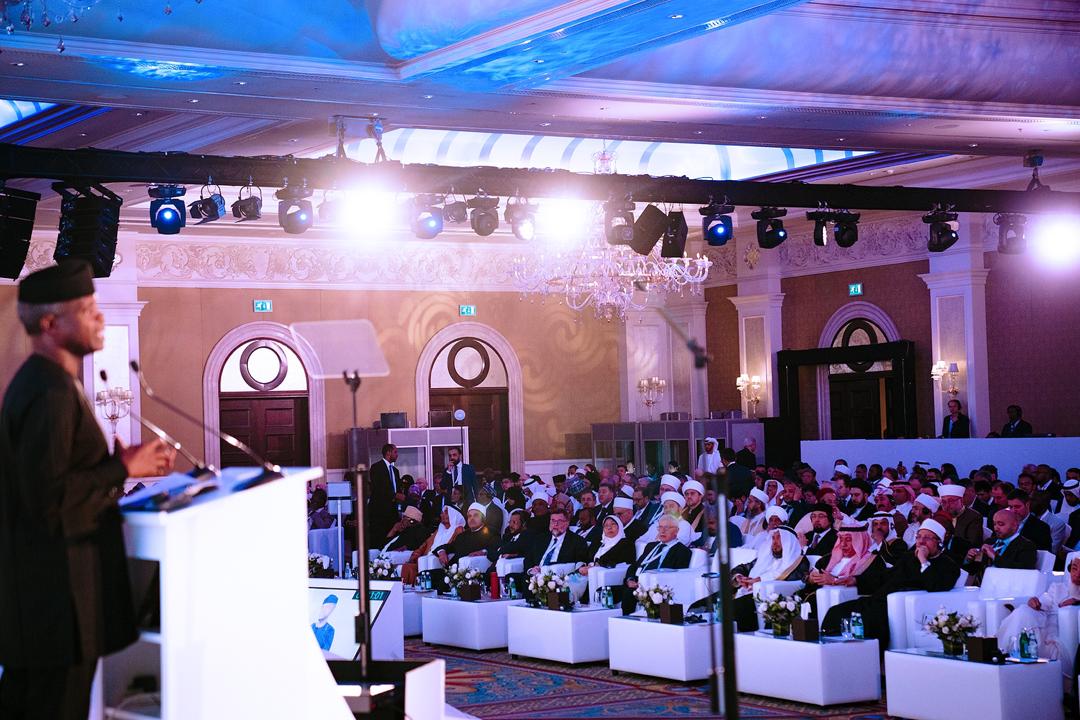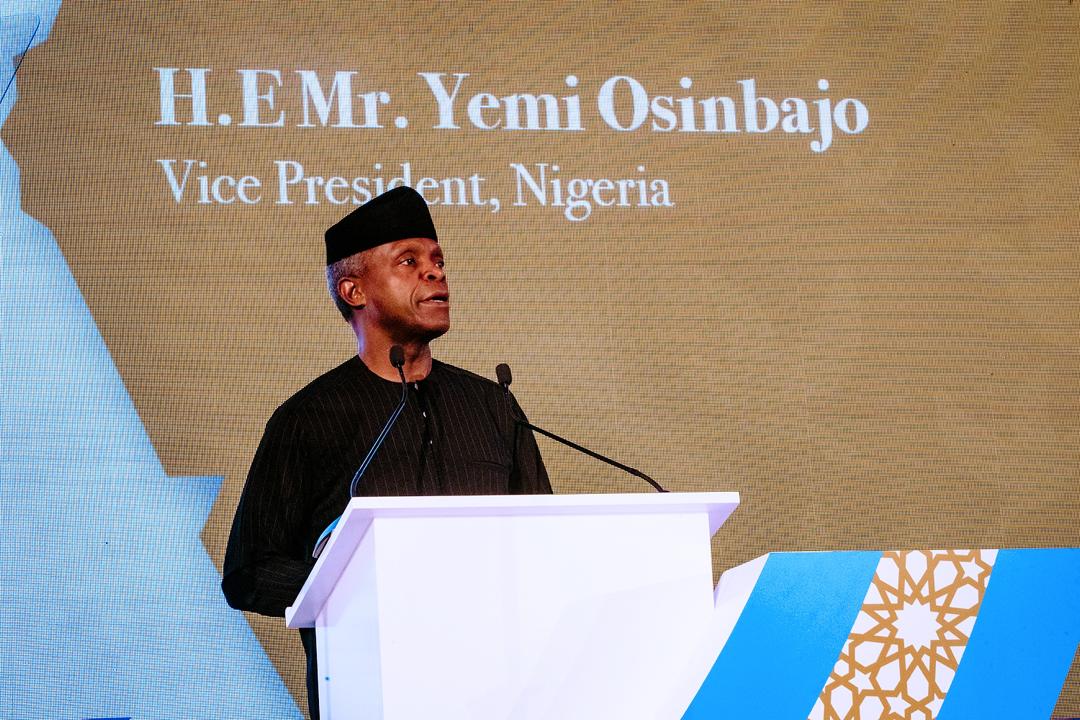VP’s Remarks At The Sixth Assembly Of The Forum For Promoting Peace In Abu Dhabi
KEYNOTE ADDRESS BY HIS EXCELLENCY, PROF. YEMI OSINBAJO, SAN, GCON, THE VICE PRESIDENT, FEDERAL REPUBLIC OF NIGERIA, AT THE SIXTH ASSEMBLY OF THE FORUM FOR PROMOTING PEACE, IN ABU DHABI, THE UNITED ARAB EMIRATES, ON MONDAY, 9TH DECEMBER, 2019
PROTOCOLS
Permit me to begin with a note of gratitude for the honour done to me by the kind invitation of His Excellency Abdullah Bin Bayah, President of the Forum for Promoting Peace, and our most gracious host, the government of the UAE, represented by His Highness Sheikh Abdullah Bin Zayed Al Nahyan, to speak on “the role of religions in promoting tolerance: from possibility to necessity.”
I also must say that the government of the UAE deserves our commendation for designating 2019, the Year of Tolerance, and this forum for taking up the challenge of attempting to forge a consensual ethic for promoting tolerance.
The defining paradox of our world today is that thanks to technology and globalization, we have never been more connected than we are today, and at the same time we have probably never been more divided than we are today, and this is the handiwork of agents of intolerance who weaponize our fear of the ‘other’.
In recent years, we have witnessed a rise of religious extremism, right-wing populism and ultra-nationalism. We have seen extremists hijack the symbols and letters of the faiths and use them to prosecute violent campaigns that violate the sanctity of human life on a global scale: ISIS, ISWAP, Boko Haram etc.
There is scarcely any region of the world that has not been scarred by the plague of terrorism. And yet, such is the pluralistic composition of our societies that to allow the promotion of hatred and strife between our communities is to permit the destruction and fragmentation of our communities and nations. Therefore, if we are to prevent an endless cycle of strife, and conflict, tolerance is a necessity.
But whose duty is it? On whom does the responsibility lie to bear the torch of tolerance and illuminate new pathways to a shared future?
It is my respectful submission that the burden rests squarely on leaders, especially religious, and political leaders, and others we may describe as the elite in our nations and communities.
It is our role not only to articulate, as we are doing in this assembly today, the theoretical and doctrinal foundations for a more tolerant world but more importantly to make the personal sacrifices that would compel our societies to commit themselves to lifestyles of tolerance.
This, if I may say, is the difficult part. But let us quickly deal with the articulation of principles that are the foundations of the idea of tolerance.
The first principle is to recognize that there is no merit to the notion that the contemporary plague of terrorism and extremism is an inevitable fulfilment of the thesis of the idea, the so-called “Clash of Civilizations” – But merely grim, in my view, are the apocalyptic vision of the world’s major faith communities locked in perpetual conflict. The great conflict of our time is not between Islam and Christianity, or between Islam and other religions, but between extremism and human solidarity, between the forces of hate and intolerance and those of empathy and peace – that is the great conflict today.
The second is to emphasize the central place of the principle of empathy. This is a thread that runs through our moral traditions, and is summed up in the Golden Rule in the words of Jesus Christ where he said, “do unto others as you would have them do unto you.” Jesus Christ goes further to say that “we must love our enemies; we must even pray for our enemies.” This is the notion of self-sacrifice. In other words, all of these is summed up in the general principle that we must treat others as we ourselves would like to be treated, and this is embedded in the Abrahamic traditions and other major religions.
It is an expansion of this consciousness that enables us to humanize others regardless of distinctions that are rooted in class, ethnicity, gender, race or religion. In so doing, we transcend ourselves.
The injunctions of many of our religions, that emphasize compassion, mercy and kindness as the central tenets of religious living are rooted in empathy.
Also, the core values of the major religions validate the notion that tolerance is fundamental to all communal, and interpersonal relationships. One of these core principles is the recognition of our shared humanity despite our diversity.
In Acts 17:26, the Holy Bible says, “And He has made from one blood every nation of men to dwell on all the face of the earth, and has determined their pre-appointed times and the boundaries of their dwellings.”
The Quran also similarly proclaims, “Human beings, we created you all from a male and a female, and made you into nations and tribes, so that you may know one another.”
These words not only bid us see our diversity as a blessing of Divine Providence but also impose a responsibility on us to continue to learn as much as we can about each other and to use such knowledge to answer and silence the purveyors of prejudice and bigotry. If extremists practise the demonization of difference, then we must proffer the idealization of diversity as a providential gift.
This recognition of our shared humanity is also the basis of universal human rights. Indeed, as argued by Michael Ignatieff (from whose thoughts in “Human Rights as Politics and Idolatry” I have borrowed liberally in this presentation); he says, “It is the religious conception of human beings as God’s creation that sustains the notion that people should have inviolable natural rights. Human rights are an affirmation of the sanctity of life. It is precisely because all human beings are sacred in our worldview that they deserve all of what they get.” And this also means that all human beings should be treated with dignity.
Our promotion and defence of human rights must also be rooted in empathy. We judge human actions by the simple test of whether we would like to be on the receiving end. Because we feel pain, we can recognize the pain of others, and therefore believe that all human beings should be protected from cruelty.
In other words, the very religious virtue of compassion is the primary inspiration for articulating human rights. We also recognize that respect for human rights is impossible where institutionalized prejudice and bigotry prevent some people from seeing others as fully human.
Under these circumstances, tolerance, peaceful coexistence and human dignity cannot be realized merely as helpful moral suggestions.
Consequently, empathy inspires us to seek justice and enshrine human rights in constitutional and legal orders so as to protect all of us from arbitrary power. This is what praiseworthy initiatives such as the Marrakesh Declaration on the Rights of Minorities in Muslim Majority States represent.
So, the path to a more tolerant and peaceful world will be travelled along parallel tracks through the framing of national and international legal instruments that protect human rights, as well as through the work of leaders, peacemakers in civil society committed to blunting the weapons of bigotry and hatred. We cannot in any way minimize the importance of this legal text and others.
This brings me to the second issue – the central role of leaders in promoting and establishing tolerance in our societies.
Earlier this year, I was privileged to receive Imam Abubakar Abdullahi, an 83-year-old Muslim Cleric who had come to international prominence as a result of an extraordinary event.
In June 2018, Christians in the village of Nghar Yelwa, in central Nigeria were attacked by persons who were identified to be Muslims, who had attacked other villages and killed several local farmers who were mainly Christians.
As Imam Abdullahi was finishing midday prayers, he and his congregation heard gunshots and they went outside to see members of the village’s Christian community fleeing for their lives. Instinctively, the Imam ushered 262 Christians into the mosque and some into his home next to the mosque.
The Imam then went outside to confront the gunmen. He refused to allow them to enter the mosque, pleading with them to spare the Christians inside the mosque and his home. When the assailants were adamant, he told them that they would have to kill him first if they were going to kill the Christians he had given refuge.
They eventually left without killing any of the Christians in the mosque or in his home. Imam Abdullahi’s selflessness and sacrifice saved the lives of hundreds of people of a faith different from his own. He not only refused to give up the Christians he had given refuge; he even offered his life in exchange for theirs.
His moral courage is rooted in a profound recognition of our common humanity. His compassion, empathy and selflessness are an example to us as people of faith.
Also consider the story of two remarkable religious leaders, Pastor James Wuye and Imam Muhammad Ashafa. These two are Nigerians; one a Christian and the other a Muslim. As young men in the 1990s, both of them had led rival gangs engaged in violent clashes in the city of Kaduna in Northern Nigeria. At the time, they were mortal enemies on opposite sides of deadly sectarian conflicts in which Imam Ashafa lost two brothers and his teacher, and Pastor Wuye lost his right hand to a machete attack in 1992.
Both men paid a heavy price for their mutual enmity and their thirst to exact vengeance upon each other. However, in the years that followed, a curious thing happened. Through the intervention of a mutual friend and a series of separate personal epiphanies and meetings, these two men came to increasingly respect each other and eventually decided to work together.
In 1995, Ashafa and Wuye co-founded the Interfaith Mediation Centre, a religious grassroots organization that has successfully mediated between Christians and Muslims throughout Nigeria. Their organization, which now has over ten thousand members, engages with militias and trains youths, as well as women, religious figures and tribal leaders to become civic peace activists.
Under their leadership, young Muslims and Christians jointly rebuild the mosques and churches they once destroyed in violent sectarian clashes.
For over fifteen years, these two religious leaders who were once mortal enemies have travelled the world together preaching a message of peaceful coexistence. Their work has not been easy. Both of them have had to confront pessimism about their endeavours within their own communities and deep doubts about the possibility of peaceful coexistence.
But there is no doubt that their efforts are yielding fruits and contributing to gradual psychological disarmament among communities that hitherto saw themselves as mortal enemies. This is the very nature of self-sacrifice in bringing about peace.
I tell you another story. A few months ago, a leader of a major Christian denomination in North-East Nigeria sought an audience with me. He comes from one of the States that Boko Haram insurgents had repeatedly attacked. He said he would like the governor of his state, a Muslim, to be given a national honour, and I asked why. He said the governor rebuilt over 90 churches burnt down by Boko Haram insurgents.
A Muslim rebuilding churches burnt down by insurgents is the clearest and most unequivocal way of saying that Islam does not support the destruction of places of worship of other faiths. The governor’s action spoke louder and more persuasively than the citation of many scriptures.
The stories of Imam Abdullahi, Pastor Wuye and Imam Ashafa, and the governor, are significant because in each case the leaders had to make almost suicidal sacrifices. They had to take unpopular steps. They had to confront people of their own faith to see the value and worth of people of other faiths and beliefs. They put their credibility, and even lives, on the line. It is these types of sacrifices that can root out intolerance and bigotry.
No amount of words or platitudes can change the human predisposition to prejudice and parochialism. Only acts of deep humility and personal sacrifice can. There is no question at all that this is the responsibility leadership places on those of us who are religious and political leaders in our countries. The responsibility of leadership is not just words, it is not text, it is not just laws. The responsibility of leadership is self-sacrifice, it is putting our reputation on the line, it is putting our words into action.
Thank you very much.


